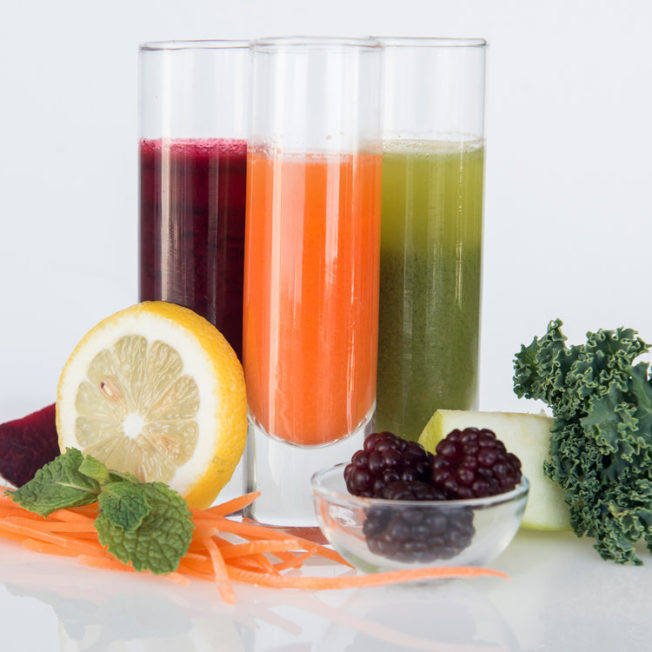There are two types of people in the world: Those who are willing to jump on any wellness bandwagon, and those who give every new wellness trend the side eye. I fall into the former camp; I’ll try anything that promises to make me look, feel, or be better in some way… but I have to say, thank God(dess) for the skeptics. As it turns out, not every wellness trend is actually beneficial to your well-being — and these three controversial wellness practices prove it.
The Blood Type Diet
There’s no shortage of diets to try if you’re in search of a healthier bod. The Atkins Diet and the South Beach Diet started the craze all the way back in the late eighties, and fad diets have been popping up (and subsequently fading away) ever since. The Blood Type Diet, developed by a naturopathic doctor in 1996, has seen renewed popularity lately. Some people swear by it — and some people swear it doesn’t work.
The Blood Type Diet is pretty much what it sounds like: Eating according to the blood type you have. In a nutshell, Type As are supposed to stick to a mainly vegetarian diet, since they may have a hard time digesting animal proteins. Type Bs should subscribe to a paleo-esque diet; Typo Os thrive on lean meats; and Type AB is more well-rounded.
Even though it’s kind of stood the test of time, there isn’t a lot of science to back this theory up. According to Healthline, “Not a single well designed study has been conducted to either confirm or refute the benefits of the blood type diet.”
Basically, if it makes you feel good, go for it. But if you already have a diet that’s working for you, there’s no need to adjust your eating habits to align with your blood type.
Juice Cleanses
Has there ever been a health fad as polarizing as the juice cleanse? Probably not. On one side of the argument, you have the wellness buffs who believe that cold-pressed vegetable and fruit juices are the key to life; on the other, you have those who call bullshit. Which side is right? Well, both.
There’s no denying that cold-pressed fruits and veggies are good for you. Think about it this way: When a food is juiced, you’re able to consume more of it than you could if you were eating it whole (the average glass of celery juice features at least 10 celery stalks — and there’s no way you’re going to chomp down on that much celery regularly, right?). But by consuming juice, you give your body a ton of vitamins and nutrients in one go (with very few calories); so theoretically, juicers should see a boost in their overall health — and maybe even lose some weight.
However, problems occur when you equate juicing with “detox.” Dr. Haider Al-Hilaly, a general practitioner based in the UK, told The Zoe Report, “Our body detoxifies itself through the digestive tract, liver, lungs and kidneys. Juice cleanses may contain less calories and fat than normal meals and make us lose weight, but they don’t ‘detoxify’ anything.” (It’s worth noting, though, that some juices can support your liver and kidneys and thus aid in the body’s natural detoxification process.)
Another problem with juicing? It strips vegetables of their fiber, making them harder to digest than regular food. If you have gut or digestive issues, it’s not the best idea to stick to a juice-only diet; it may just exacerbate the problem.
Otherwise, go forth and juice — just make sure to incorporate other healthy (cooked) foods into your meal plan, too.
Colonics
Most Western doctors will tell you to never get a colonic — there isn’t a lot of scientific evidence to prove its useful — but that hasn’t stopped millions of people from trying out colon hydrotherapy for themselves.
For the uninitiated, the colonic process involves “flushing” out the colon by inserting a tube into the rectum and filling it with water and, sometimes, herbal extracts to help the process along. When the water passes back out the other way, it brings along all the excess waste that has built up inside your body. (Graphic, but true.) The thought is that colonics help “loosen” any waste matter or toxins that have gotten stuck in the colon and digestive tract. By eliminating this excess waste, you set yourself up to have a healthier gut. (Most people lose a couple pounds during a colonic session, too.)
Those loyal to the flush recommending doing a “colon cleanse” of three consecutive colonics over a week-long period to help “reset” your gut and digestive system. Those opposed to it claim that there’s no scientific evidence to back it up. The choice is yours… but I will say that I felt incredible after my own colon cleanse, and I’m a believer.
At the end of the day, “wellness” is a broad concept that will look different for every individual. If your body thrives on the Type A diet, drinking juice every morning, and getting regular colonics — then go for it. But if these practices don’t sit right with you, leave ‘em behind.
Photographer Credit: Whitney Thomas Photography

















